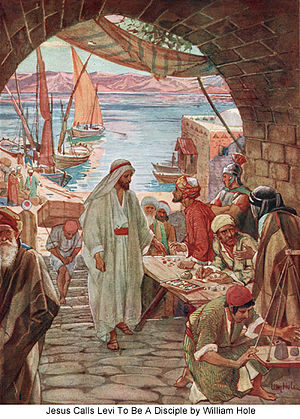John 6: 12 & 13
12 When they had all had enough to eat, he said to his disciples, “Gather the pieces that are left over. Let nothing be wasted.” 13 So they gathered them and filled twelve baskets with the pieces of the five barley loaves left over by those who had eaten.

Jesus calls Levi. From book: The Life of Jesus of Nazareth. Eighty Pictures. (Photo credit: Wikipedia)
In the first 2 posts on the topic of what to do in times of need, we looked at the problem-solving steps taken by Jesus when He fed over 5,000 people with 5 loaves and 2 fishes. To summarize, the problem solving steps are:
- Identify the problem.
- Propose a solution that actually meets the need(s) presented by the problem.
- Scan the environment for resources that can help to solve the problem.
- Break down the problem into manageable units.
- Give thanks to God for what you have.
- Execute the plan.
So what should we do at the end of the plan? When an event is over, most people simply move on to another activity. But Jesus didn’t stop there. He instructed His disciples to “Gather the pieces that are left over. Let nothing be wasted.” The disciples obeyed and gathered 12 baskets of food – which is far more than what they started out with. There are byproducts for every plan and activity. This truth applies to everything we do, whether done in groups or alone and regardless of the type activity.
It is important to look at all the byproducts and end products of all our plans in a systematic way. The disciples were systematic in gathering the left overs: They counted the baskets. Twelve baskets were enough for each disciple to have food for another day or more. By acting in faith, the disciples had been given provisions for themselves. Maybe they gave some food to the poor. Regardless of what they did with the leftovers, we know that because they gathered and counted the leftovers, they intended to put them to use.
Jesus made it plain that recycling of byproducts of our plans and activities prevents waste. The original Greek word for “wasted” used in verse 12 means: “to destroy fully (reflexive to perish, or lose), literal or figurative :- destroy, die, lose, mar, perish,” (Strong’s Talking Greek and Hebrew Dictionary). We don’t leave resources behind because doing so risks total disfigurement or destruction of what we leave behind. When we allow resources to perish, we lose the opportunities and possibilities created by the work we do.
One of the ways the enemy of our souls “kills, steals and destroys” people and property is by laying waste to the things, people and opportunities that we fail to gather. Parents get divorced, start new families and lose touch with former spouses and their children. Children born out-of-wedlock are left for other families or local governments to care for. Abandoned homes become crack houses that destroy neighborhoods. Can you think of more examples?
Brothers and sisters, look around you. What have you failed to gather and quantify? What byproducts of activity have you failed to make plans for? One thing we know: God blesses abundantly. It is not enough for us to consume the bounty God gives. We must also diligently look for, gather and quantify left-overs, so that all our resources remain available for use according to God’s will.
In many ways, Jesus is “the great recycler.” We are the broken pieces the destroyer (death, Hell, Satan) would have devoured if Jesus hadn’t come to gather us to His bosom. Through His death and resurrection, He secured a place in Heaven for all who have faith in Him. Our names are written in the Lamb’s Book of Life, and even the very hairs of our head are numbered. Give thanks to the Father for Jesus. Bless His name today, for accepting us in the Beloved. In our daily lives, we should problem solve like Jesus who had a plan that went from alpha to omega.
Pick up the pieces. Let nothing be wasted.
May these words comfort and teach you today. Until we meet again: “Be strong in the Lord and in the power of His might.” (Ephesians 6:10)
Verneda
Twitter handle: @vlights
© 2012 Verneda Lights. All Rights Reserved.
Related articles




